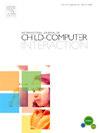探索幼儿在不插电计算思维中的元认知
Q1 Social Sciences
International Journal of Child-Computer Interaction
Pub Date : 2025-08-19
DOI:10.1016/j.ijcci.2025.100767
引用次数: 0
摘要
本研究探讨计算思维(CT)对提高青少年学习者元认知策略的影响。我们对四名五年级学生进行了一对一的视频采访,因为他们参加了一个改编版的不插电CT活动,Bebras的(2019)编程灯任务。我们的研究结果表明,CT特别有助于自我监控和评估策略的发展,例如持续评估一个人的表现,在现有解决方案失败时采用新策略和探索替代方案。当学生分解问题并逐步开发解决方案以响应任务场景中不断变化的挑战时,这一点尤为明显。总体而言,本文讨论了CT与元认知策略之间的潜在联系,重点讨论了CT如何成为教师培养学生解决问题能力和学习成绩的宝贵工具。本文章由计算机程序翻译,如有差异,请以英文原文为准。
Exploring young children's metacognition during unplugged computational thinking
This study explores the impact of computational thinking (CT) on enhancing metacognitive strategies among young learners. We conducted one-on-one video interviews with four fifth-grade students as they participated in an adapted version of the unplugged CT activity, Bebras's (2019) Programming Lamps Task. Our findings suggest that CT particularly contributes to the development of self-monitoring and evaluation strategies, such as continuous assessment of one's performance and adopting new strategies and exploring alternatives when existing solutions fail. These were particularly evident as students decomposed problems and developed step-by-step solutions in response to evolving challenges within the task scenarios. Overall, this paper discusses the potential connection between CT and metacognitive strategies, focusing how CT can be a valuable tool for teachers in developing their students' problem-solving abilities and academic performance.
求助全文
通过发布文献求助,成功后即可免费获取论文全文。
去求助
来源期刊

International Journal of Child-Computer Interaction
Social Sciences-Education
CiteScore
7.20
自引率
0.00%
发文量
73
 求助内容:
求助内容: 应助结果提醒方式:
应助结果提醒方式:


